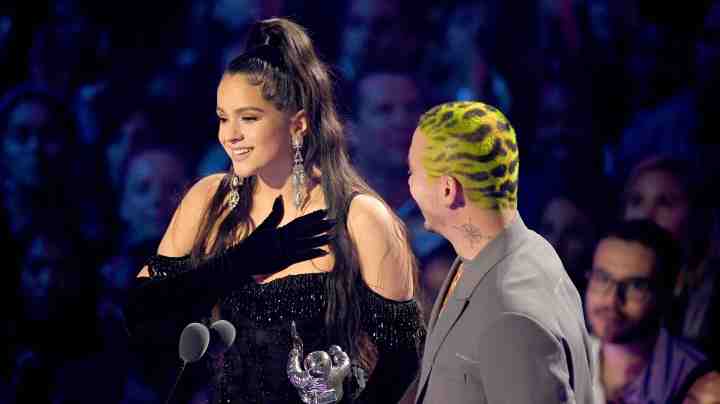Rosalía’s Best Latin Win at the VMAs Sparked Conversation on Who’s Considered Latinx

Rosalía and J Balvin onstage during the 2019 MTV Video Music Awards at Prudential Center on August 26, 2019 in Newark, New Jersey. Photo by Mike Coppola/Getty Images for MTV
Rosalía made history last night as the first Catalan artist to win two MTV Video Music Awards. Her second time in attendance was a triumphant one, rightfully replete with admiration across the board. Rising solo pop dream Normani fangirled over her backstage, and a few interviewed artists, including ASAP Ferg and DJ Khaled, declared her one of the most awaited performances of the night. As always, her live renditions (a breathless ode to her first love of flamenco with “A Ningún Hombre,” and “Yo x Ti, Tu x Mi” alongside Puerto Rican caramelito Ozuna) did not disappoint.
Prior to taking the stage and making full use of her allotted time to present a succinct, yet varied, glimpse of what she has to offer, she and J Balvin took home the award for Best Latin thanks to their song of the summer nominee, “Con Altura.” Though it’s not her fault that the music industry groups artists from Spain, Latin America and Latinxs from the United States together, she didn’t take the opportunity on stage to explicitly clarify that she isn’t Latina. She did, on the other hand, hint at inner self-awareness saying, “I come from Barcelona. I’m so happy to be here representing where I come from, and representing my culture.” Though the latter part of that statement likely ruffled some feathers as her musical roots are grounded in flamenco, and now skewing urbano – both stirring up conversation on whether or not she’s guilty of cultural appropriation – the fact that she was taking home the (hilariously named) award for Latinxs was more the issue at hand. Several people took to social media to express their confusion and disillusion:
La canción en si is a product of the efforts of several others, including Sky and Mariachi Budda, who more easily encompass the Latin label. But this is far from the first time the Catalan artist is erroneously mislabeled. Whether it’s in award shows or glossy profiles and interviews (primarily on the Anglo side, but more often than not on the Latin American side as well), seemingly purposefully ignorant folks behind the scenes detract from the 25-year-old’s talent by framing her as something she is not. In the process, they offend their audience, which is shrewd enough to know the difference between the two, and Rosalía herself, because it subtly implies that she needs the label to succeed.
Of course, this is far from the first time a mischaracterization of this nature happens. Respected Spanish artists like Alejandro Sanz, Rocío Dúrcal, Enrique Iglesias, Natalia Jiménez, and countless others have flourished within the Latinx community in the past. Uncoincidentally, most, if not all, who are welcomed with open arms both within and outside the confines of the textbook definition of “Latinx” tend to be white. But now, in a moment when the #LatinoGang movement’s reach is truly global, and urbano’s impact (specifically) is felt far and wide, it’s important to ask ourselves who benefits most and to ensure proper representation.
